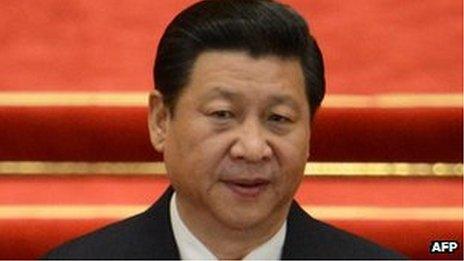US-China summit: California welcomes rise of Asian giant
- Published
- comments
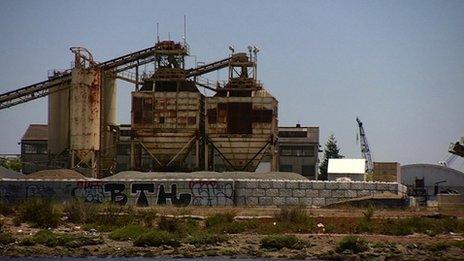
The run down Oakland waterfront has seen a $1.5bn investment from China
Five-year-old Eli is perhaps the face of America's future.
He looks a little nervous going in front of his 15 fellow pupils in his kindergarten class in a San Francisco school and reading out the children's duties for the day.
His nerves are understandable. He's speaking in a difficult, foreign language - Mandarin Chinese.
Behind him, an elegantly drawn poster of the sea, the sun, clouds and a ship, their names spelt out in Chinese characters.
This is Presidio Knolls School, external, where they practise what they call "total immersion" learning, speaking Chinese from day one.
Here, on the Pacific Ocean, where a third of the population, external are ethnic Chinese, President Barack Obama's pivot to Asia seems only natural, external.
Eli's mother, Mikhal Bouganim, says: "As an economic and cultural force in our world, it feels like an appropriate language to learn.
"And we have this little Jewish kid running around talking Chinese, and we thought it was important for him to realise not everyone looks like him or sounds like him."
Some of the children here are Chinese American but most are not.
The headmaster, Alfonso Orsini, says there has been a huge growth in Chinese-language schools.
"I think in 2007 there were some 30 programmes and that's grown to over 100 in the United States. There's a big fascination with China, that China is becoming a major force in the world."
Eli shyly tells me that he likes to use his language skills to order food in Chinese restaurants, and he would like to go to China to try it out there.
'Most potential'
He might be able to do a little more than that.
President Obama's pivot is in part because he believes this area of rapid economic growth can help revitalise the American economy, external, while Europe languishes in the doldrums.
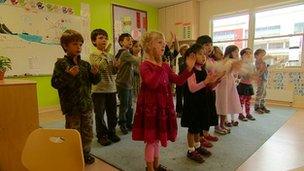
Children with no Chinese background are doing "full immersion" Chinese language classes
In many parts of America, the rise of China is seen as a threat, external, stripping manufacturing jobs, competing unfairly, on the edge of overtaking the superpower that has become used to being the world's largest economy.
That's not so true in California. Here, China is an opportunity.
In the sunshine and serenity of Napa Valley, workers trim back the vine leaves to allow the sunlight to fall on the grapes - some will be turned into wines destined for the Chinese market.
America's economic recovery is fragile and even big spenders may be wary of spending $100 (£64) a bottle.
But Lorenzo Trefethen, external, who has made five trips to China to sell the family's products, says there are plenty of high-rolling Chinese who treasure fine wine as a trophy.
"China is our biggest export market at the moment," he says.
"It is something we have been building for five years and, off of a small base, it has grown rather quickly and is absolutely the one with the most potential."
The potential is a billion people that are coming out of low income and into the middle class.
'Intertwined economies'
"There is already a well-established upper class for a lot of the wines being produced in this valley, but we are very interested in the new middle class. They want to drink the same wines that their more wealthy compatriots have been drinking."
Oakland's rusty, run-down waterfront, external seems a long way from the green of the Napa Valley, but the story is similar.
At the moment there is a sprawling, ugly, abandoned area near the harbour.
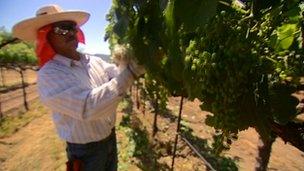
Middle-class Chinese consumers want to enjoy California wine
Brown weeds cover the ground and a low, graffiti-covered wall runs around rusting industrial structures of indeterminate purpose.
For years there have been plans to turn this into homes, shops, a park. Plans, but no money. Now the Chinese are coming with $1.5bn worth of investment and 10,000 new jobs.
Oakland Mayor Jean Quan, external tells me: "The irony is that American banks have been sitting on their capital and not investing, and it took the Chinese to break the ceiling and suddenly the banks are now interested.
"I think our economies are intertwined," he says. "We are going to grow and arise together, there's so much joint investment back and forth."
The emerging, developing relationship between China and America is a curious one. There is no doubt both countries are wary of each other, fear each other. There is good reason for that.
The White House is frank that there are risks of conflict and this summit is aimed at establishing personal relationships.
Cybersecurity will be one hot topic, with China openly accused of stealing military and business secrets.
'Actually accomplishing something'
President Obama's pivot to Asia is in part military - there is an increase of US forces in the Pacific.
The Chinese are hugely irritated by this at a time when they are building up their own navy, proclaiming sovereignty over disputed islands. The man in charge, external of the US fleet says he will not stand idly by.
Then there is North Korea and Taiwan. The Asia Society's Bruce Pickering, external told me there are plenty of flashpoints in the relationship.
"It's always going to have dangerous elements to it, but it doesn't have the ideological edge the Cold War had," he says.
"The ideological under-pinning, which created a real sense of menace, is just not there.
"The two countries have no real, natural reason to fear each other, but they have to sort out a relationship and we are only in the opening stages of that. "
At the kindergarten, the headmaster, Alfonso Orsini, urges fellow Americans not to worry about China.
"Face is very important in Chinese culture," he says. "Having dignity and a stance in the world. I see Chinese people are proud when they see those GDP figures, or successes of the economy.
"You kind of need the pride to keep going. I think that's what we have to understand, that the pride is not meant to put it in other people's faces, but to say, 'we are actually accomplishing something, recognise us.'"
In Napa Valley, Lorenzo Trefethen feels the worst sort of conflict can be avoided.
"I hope that the closer we knit our economies and the more trade links that we have the easier it will be to deal with those clashes and the less destructive that they will be.
"We've already had clashes - it's not something that is going to happen, it is something that has happened - and what we've seen is that by working together we are able to solve these problems as they arise."
That is the aim of this desert summit: to establish a personal relationship between the two most important leaders in the world, a hotline which may go a long way to head off the dangers ahead.
- Published6 June 2013
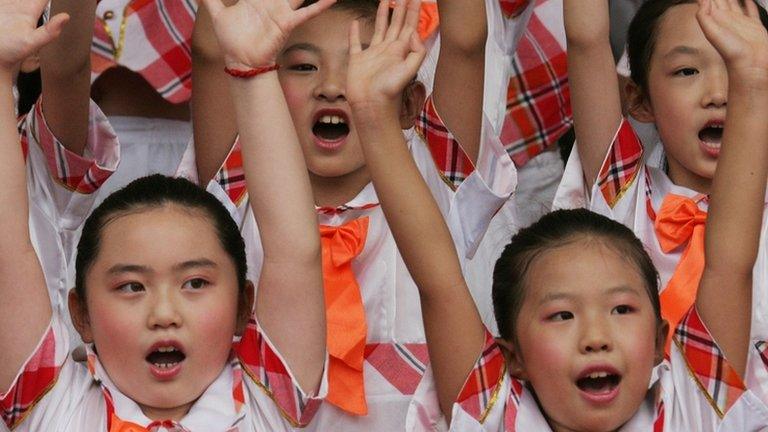
- Published3 June 2013
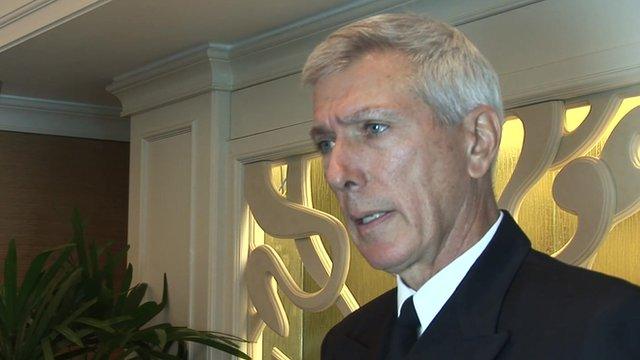
- Published31 May 2013
